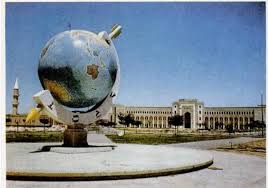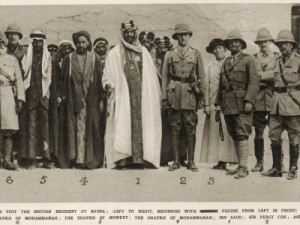Several years ago, after one of Iraq’s convoluted elections, more foreign Arab Jihadis were flowing into that country, killing and maiming civilians, especially those of the Shi’a denomination. So did Wahhabi and Salafi money and weapons flow into Iraq, which was seen by the Wahhabis and their royal tribal potentates to have been “usurped” by the wrong people.
Some Saudi spokesmen, one of them worked at the time for the ambassador/prince/kleptocrat in Washington (he later moved on to Harvard), issued dire warnings, nay threats, via the Washington Post. They warned that they can roll back the growing Iranian influence in Iraq by destroying the Iranian (and presumably the Iraqi) economy. The method suggested was by flooding the world market with crude oil. At that time oil prices were high and Persian Gulf producers’ treasuries were flush with surplus cash. I wrote at the time on this site pointing out that the Saudi economy could not afford a sustained increase in crude production and lower prices.
They did not listen to me. In the past couple of years the princes took up the wrong advice: they started a deliberate policy of lowering crude oil prices, aimed at crushing the besieged Iranian economy and weakening the Russian economy (both allies of the Syrian regime, both supporters of Iraq). Like everybody else, they used oil as a political weapon. They probably also had the additional aim of weakening the shale industry in North America. Saudi production of crude oil increased and prices plummeted to much lower levels than they had expected (much lower than most observers expected).
They all waited with baited breath for the low price and the long Western economic blockade to bring the Iranian economy to its knees, for the Iranian Ayatollah to call the Saudi king and cry “uncle”. For Brig. Qassem Suleimani to be sent packing home and maybe for Iraq to be handed back to the former Baathists. Neither happened, but there is now an economic backlash, and possibly a political backlash brewing in the kingdom of no legal breweries.
The Saudi foreign exchange reserves are being depleted and they have now been forced to cut domestic spending (the princes still keep their cut of the oil revenues). Most Saudi citizens work for the state, in effect they are employed by the princes. There are no elections that would legitimize anyone in Saudi Arabia: so, money and patronage are the price of continued absolute one-family tribal rule. With revenues plummeting and foreign reserves being depleted, the main tool of legitimizing the avaricious ruling family has weakened for the second time since the 1990s.
Of course the security services are as strong as ever, in fact they are stronger than ever. That is how the princes have stimulated the economy: by hiring tens of thousands of tribal members for the security services. The tame Wahhabi clerical establishment also toes the line and tries to do its part.
Now the Saudis face their second inevitable defeat in their adventure in Yemen (sooner or later). As the new quagmire in Yemen continues, with Saudi warplanes daily bombing civilian and other targets, the Western powers turn a blind eye to human rights violations as they compete to sell more weapons. The cost of the war also goes up: using and servicing and replacing state-of-the-art Western weapons is very costly. But it is one way of recycling the dwindling oil revenues and jiggling the balance of trade with the large industrial countries.
Tightening the belt may be wise economic policy, but it reduces the “legitimacy” of the ruling princes in the eyes of the tribes and many other citizens.
Expect more domestic trouble in the Arabian landmass that stretches north of Yemen and extends to humorless Jordan and western Iraq.
Cheers
Mohammed Haider Ghuloum 




